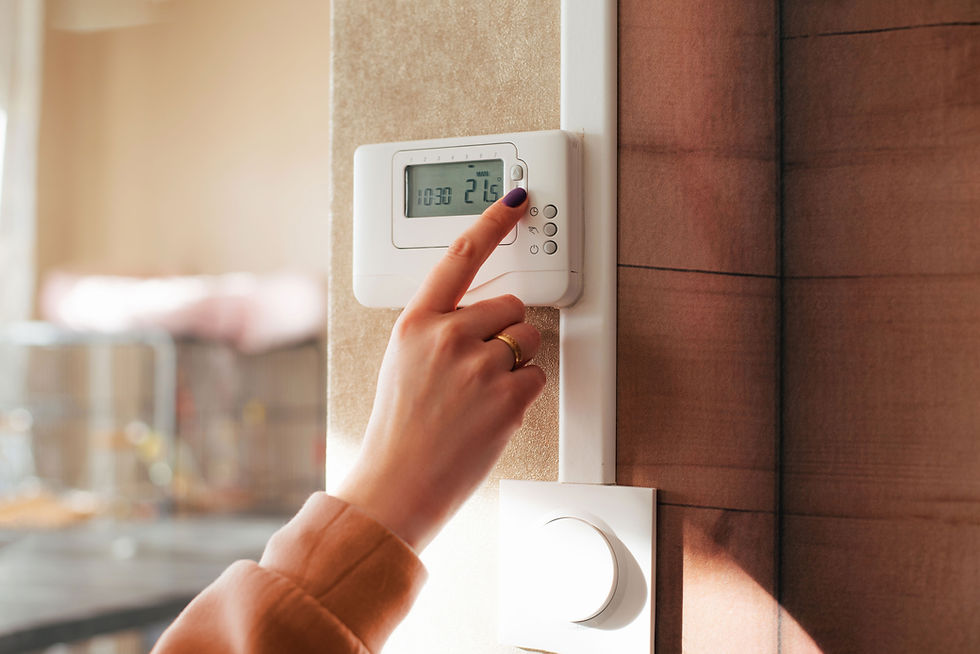How to Troubleshoot Your HVAC System Like a Pro
- Jordan McNeil
- Dec 10, 2024
- 4 min read
There’s never a convenient time for your HVAC system to break down, but the stakes feel much higher when it happens during a freezing winter night or a hot and humid summer day. While regular professional maintenance is key to keeping your HVAC system in peak condition, some issues can crop up unexpectedly. The good news? Many of these can be addressed with a little DIY troubleshooting before calling in an expert.
Let’s dive into some actionable steps you can take to diagnose and potentially fix common HVAC issues, ensuring your home stays comfortable year-round.

What Is an HVAC System?
Before we can troubleshoot an HVAC system, we first need to know what it is! HVAC stands for Heating, Ventilation, and Air Conditioning. It’s the system responsible for regulating your indoor climate, including your furnace, air conditioner, heat pump, and ductwork. A well-functioning HVAC system not only keeps you warm in winter and cool in summer but also filters the air and helps maintain proper humidity levels.
7 Steps to Troubleshoot Common HVAC Problems:
1. Check the Power Source
This might seem obvious, but simple power interruptions cause many HVAC issues.
Inspect your breaker box: Has the breaker tripped? Reset it and see if your system powers up.
Look for loose connections: Ensure your system is properly plugged in and no wires are damaged.
If the breaker keeps tripping, it could indicate a deeper electrical issue, requiring a professional assessment.
2. Examine the Thermostat
Your thermostat is the command center of your HVAC system. A misconfigured or faulty thermostat can cause your system to malfunction.
Check the settings: Ensure it’s set to “auto” and not just “on.” Double-check the temperature settings to ensure they’re appropriate.
Replace batteries: If your thermostat is battery-operated, install fresh batteries.
If your thermostat still doesn’t work, it might need recalibration or replacement.
3. Replace the Air Filter
A clogged air filter can severely impact airflow, causing your system to work harder and less efficiently.
Inspect the filter: If it looks dusty or gray, it’s time for a replacement.
Set a schedule: Change filters every 1-3 months, depending on your system and household activity.
Pro tip: Clean air filters improve energy efficiency and indoor air quality, saving you money in the long run.
4. Inspect the Vents and Ductwork
Uneven heating or cooling? Check your home’s vents and ductwork.
Ensure vents are open: Sometimes vents get accidentally closed or blocked by furniture.
Clear obstructions: Remove any debris, dust, or objects that could block airflow.
If the issue persists, leaky or dirty ductwork might be the culprit, which often requires professional cleaning or sealing.
5. Reset the System
Sometimes, a simple reset can work wonders for your HVAC system.
Locate the reset button: Check your owner’s manual for instructions on resetting your specific model.
Power down and restart: Turn off your system for a few minutes, then power it back on.
This can help resolve minor glitches and recalibrate the system
.
6. Inspect the Outdoor Unit
Your outdoor unit is exposed to the elements, which means debris, leaves, or snow can interfere with its operation.
Clear the area: Remove leaves, branches, or snow buildup from around the unit.
Check for ice: In winter, ice can form on the unit. Use warm (not hot) water to gently melt it.
Be cautious not to damage the fins or other components during cleaning.
7. Call a Professional Technician
If you’ve tried these steps and your system still isn’t functioning correctly, it’s time to call an expert. HVAC professionals have the training and tools to diagnose and fix complex issues safely.
Why Regular Maintenance Matters
Taking a proactive approach to HVAC care can prevent many common problems:
Schedule annual tune-ups: Professional inspections can identify potential issues before they become major repairs and drastically increase the lifespan of your HVAC system.
Clean components regularly: This includes air filters, vents, and ducts to keep the system running smoothly.
Your Local HVAC Experts in Hamilton
At Elevate HVAC, we understand how frustrating it can be to deal with HVAC issues, especially during extreme weather. Since 2019, we’ve been helping Hamilton homeowners keep their systems running efficiently with friendly, affordable, and reliable service.
Our certified technicians are here to:
Perform routine maintenance.
Provide emergency repairs.
Offer expert advice on energy-efficient upgrades.
Need help fast? Contact us today to schedule your service call and get your HVAC system back in shape!
FAQs About HVAC Troubleshooting
1. How often should I replace my HVAC filter? Replace your filter every 1-3 months, depending on usage and air quality.
2. What’s the average lifespan of an HVAC system? With proper maintenance, most systems last 10-15 years.
3. Can I reset my HVAC system on my own? Yes, but always refer to the owner’s manual for the correct procedure.
4. When should I call a professional? If you’ve tried basic troubleshooting without success or noticed unusual noises, odors, or performance issues, it’s best to call an expert.
Elevate your comfort with Elevate HVAC—your trusted partner for all heating and cooling needs in Hamilton!

Comments